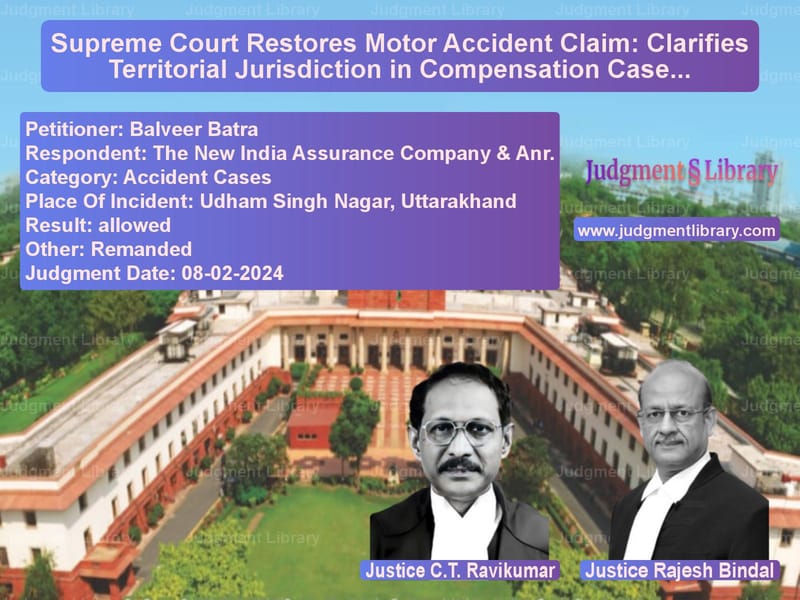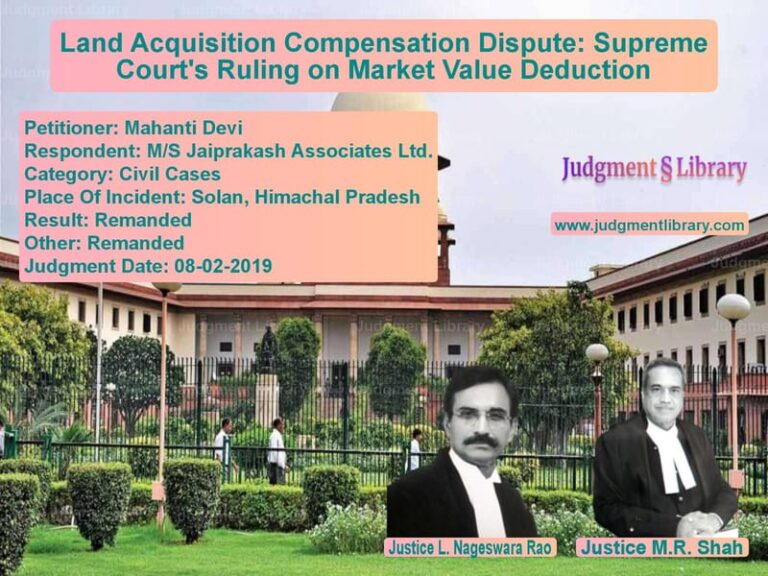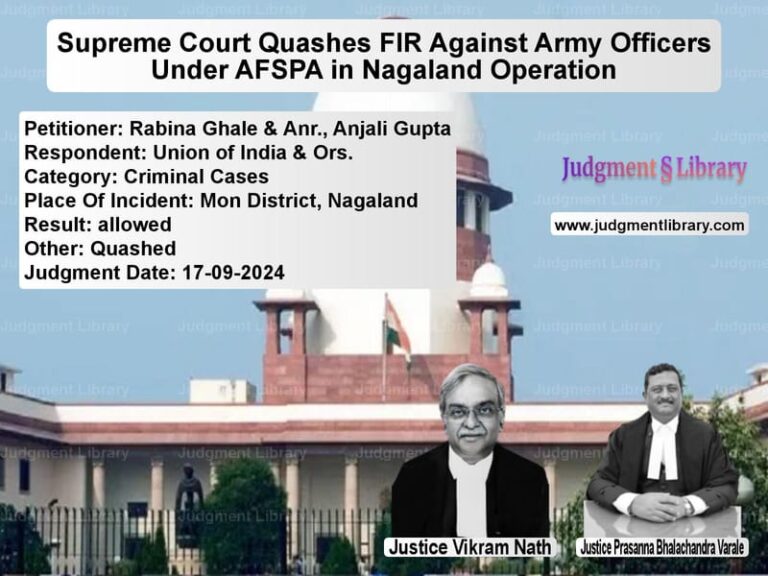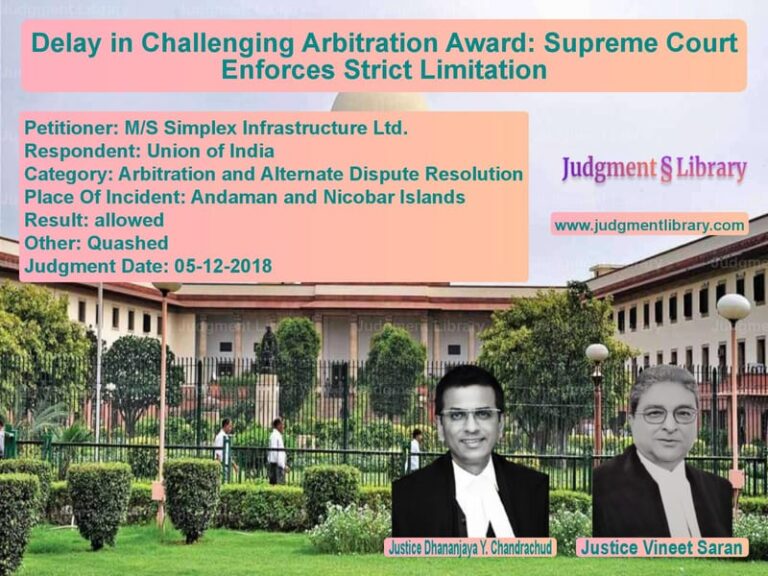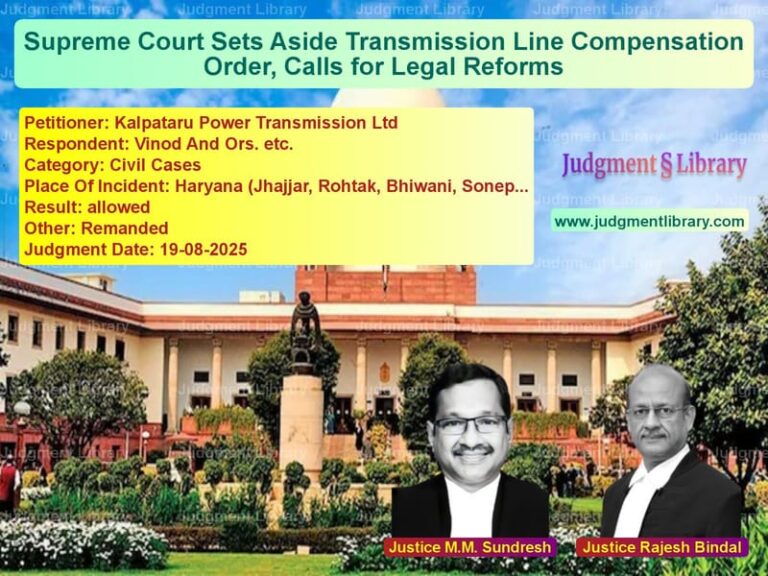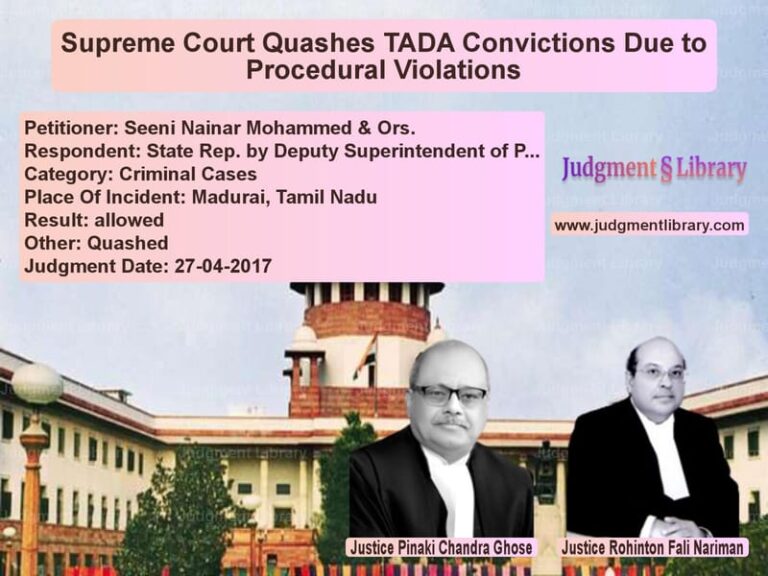Supreme Court Restores Motor Accident Claim: Clarifies Territorial Jurisdiction in Compensation Cases
The Supreme Court, in Balveer Batra v. The New India Assurance Company & Anr., reinstated a motor accident compensation claim that had been dismissed on grounds of territorial jurisdiction. The Court held that procedural technicalities should not override substantive justice, particularly in benevolent legislation like the Motor Vehicles Act, 1988.
Background of the Case
The case arose from a motor vehicle accident in which the appellant’s son was fatally injured. The accident occurred on March 7, 2006, when a tractor bearing number UP-02A-2213, allegedly driven negligently, hit the deceased while he had stopped his motorcycle. The father of the deceased, Balveer Batra, filed a claim under Section 166 of the Motor Vehicles Act, 1988, before the Motor Accident Claims Tribunal, Nainital (MACP No.137/2006).
The Tribunal dismissed the claim solely on the ground of lack of territorial jurisdiction. The Uttarakhand High Court upheld the Tribunal’s decision, leading to this appeal before the Supreme Court.
Key Legal Issues
- Whether the Claims Tribunal at Nainital had jurisdiction over the matter.
- Whether an objection on territorial jurisdiction should result in the dismissal of a compensation claim.
- Whether procedural objections should be prioritized over substantive justice in motor accident claims.
Petitioner’s (Balveer Batra’s) Arguments
- The claim was maintainable at Nainital since the insurance company had a branch office there.
- Section 166(2) of the Motor Vehicles Act provides multiple venues for filing claims, including the place where the claimant resides or where the insurance company has an office.
- The rejection of the claim solely on technical grounds denied the appellant substantive justice.
Respondent’s (New India Assurance’s) Arguments
- The accident occurred in Udham Singh Nagar, outside the jurisdiction of the Nainital Tribunal.
- The residence of the deceased at the time of the accident was not within Nainital.
- The claim should have been filed in the appropriate tribunal where the accident took place.
Supreme Court’s Observations
The Bench, comprising Justices C.T. Ravikumar and Rajesh Bindal, examined the case and made key observations:
- “The Motor Vehicles Act is a benevolent legislation intended to provide relief to accident victims and their families. Technical objections should not defeat the purpose of the Act.”
- “Section 166(2) of the Act allows claimants to file a petition where the accident occurred, where the claimant resides, or where the respondent (insurance company) has an office.”
- “The Tribunal and High Court took an overly technical view, ignoring the fact that the insurance company had a branch office within the jurisdiction of the Nainital Tribunal.”
- “Dismissal of claims on jurisdictional grounds alone, without considering the merits, leads to denial of justice and unnecessary litigation delays.”
Key Legal Findings
- The Tribunal and High Court erred in interpreting Section 166(2) narrowly.
- The presence of an insurance company’s office in Nainital was sufficient to establish jurisdiction.
- The rejection of the claim on technical grounds was not justified.
- The Tribunal should have decided the compensation claim on merits rather than dismissing it outright.
Final Judgment
The Supreme Court ruled:
“The impugned judgment of the High Court is set aside. The award of the Tribunal is quashed, and MACP No.137/2006 is restored to the file of the Motor Accident Claims Tribunal at Nainital. The Tribunal shall proceed to decide the claim on merits within six months.”
The Tribunal was directed to allow both parties to submit further evidence if required.
Key Takeaways from the Judgment
- Claims under the Motor Vehicles Act should not be dismissed on technical jurisdictional grounds when substantial justice is at stake.
- The presence of an insurance company’s office can establish jurisdiction for a motor accident claim.
- Courts must prioritize the purpose of the Motor Vehicles Act, which is to ensure compensation for accident victims.
- Tribunals must resolve all issues on merits rather than dismissing claims outright on technicalities.
Impact of the Judgment
The ruling provides clear guidelines for dealing with jurisdictional challenges in motor accident claims:
- Prevents claimants from being denied justice due to technical objections.
- Ensures insurance companies cannot evade claims by raising jurisdictional barriers.
- Strengthens the application of the Motor Vehicles Act as a welfare legislation.
- Reduces unnecessary delays in accident compensation cases.
Conclusion
The Supreme Court’s decision in Balveer Batra v. The New India Assurance Company & Anr. reaffirms the principle that procedural technicalities should not override substantive justice, especially in motor accident compensation cases. The ruling ensures that victims and their families can seek redress without being entangled in jurisdictional disputes, further strengthening the protective framework of the Motor Vehicles Act.
Petitioner Name: Balveer Batra.Respondent Name: The New India Assurance Company & Anr..Judgment By: Justice C.T. Ravikumar, Justice Rajesh Bindal.Place Of Incident: Udham Singh Nagar, Uttarakhand.Judgment Date: 08-02-2024.
Don’t miss out on the full details! Download the complete judgment in PDF format below and gain valuable insights instantly!
Download Judgment: balveer-batra-vs-the-new-india-assura-supreme-court-of-india-judgment-dated-08-02-2024.pdf
Directly Download Judgment: Directly download this Judgment
See all petitions in Road Accident Cases
See all petitions in Compensation Disputes
See all petitions in Judgment by C.T. Ravikumar
See all petitions in Judgment by Rajesh Bindal
See all petitions in allowed
See all petitions in Remanded
See all petitions in supreme court of India judgments February 2024
See all petitions in 2024 judgments
See all posts in Accident Cases Category
See all allowed petitions in Accident Cases Category
See all Dismissed petitions in Accident Cases Category
See all partially allowed petitions in Accident Cases Category

